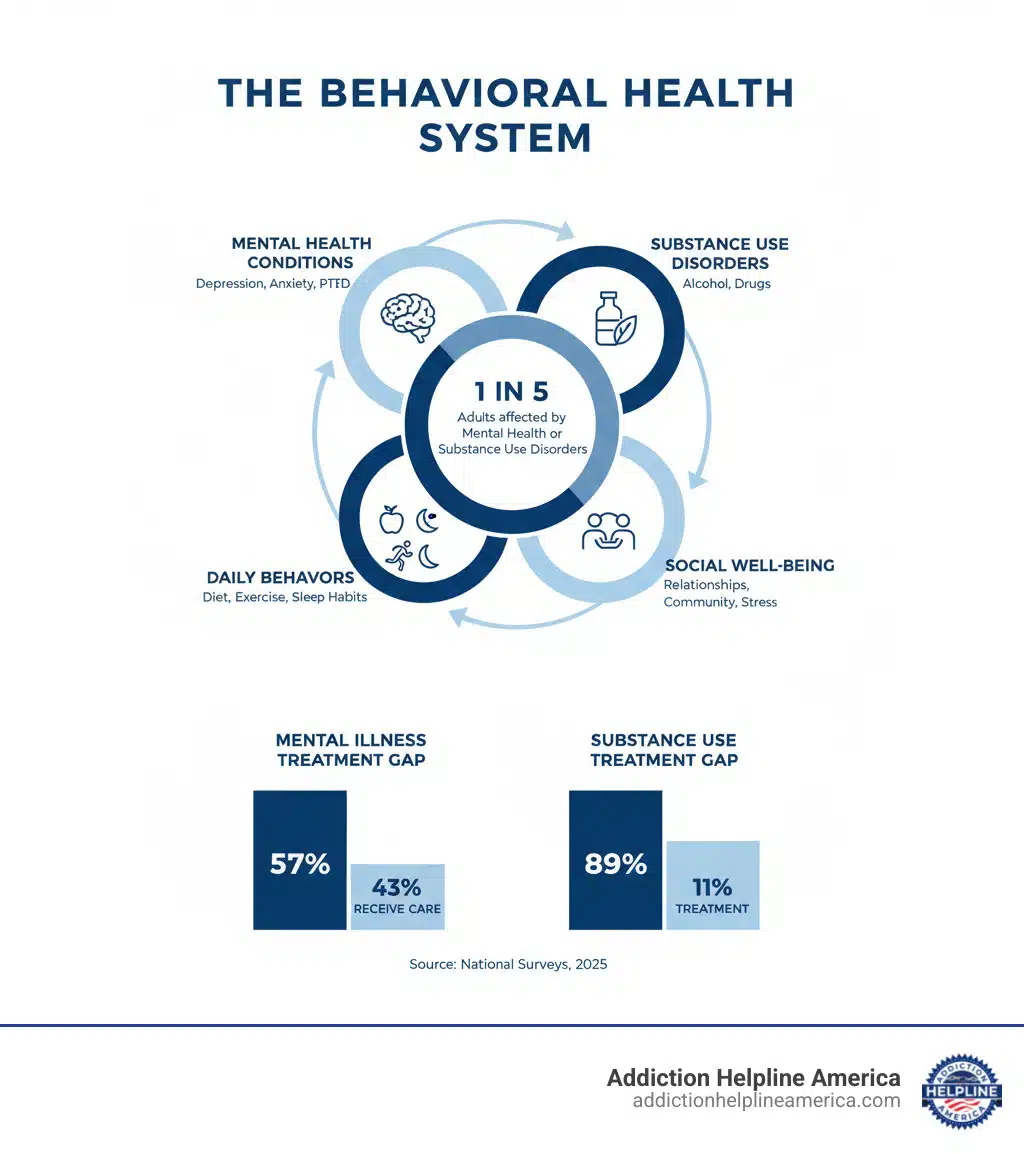Behavioral health is the connection between your daily behaviors and your overall mental, emotional, and physical well-being. It’s a broad term that covers mental health conditions, substance use disorders, and the daily choices that impact how you think and feel.
Quick definition: Behavioral health encompasses:
The statistics are stark: one in five adults in the U.S. lives with a mental health or substance use disorder. Yet only 43% of those with a mental illness and just 11% of people with a substance use disorder get treatment.
This treatment gap is enormous, partly because many people don’t realize help is available for both diagnosed conditions and everyday challenges. You don’t need to be in crisis to benefit from support.
At Addiction Helpline America, we connect individuals and families with the behavioral health resources they need. We understand how overwhelming it is to steer treatment options, which is why we provide confidential, compassionate guidance.

Behavioral health is an umbrella term for how your daily habits and choices connect to your overall wellness. A behavioral health provider takes a whole-person approach, exploring factors like your exercise routine or sleep schedule to better understand what’s driving anxiety or depression. This perspective recognizes that our actions shape how we feel, and our feelings influence what we do.


Take the first step towards a healthier life! Call now to connect with our compassionate team and start your recovery journey today. Your path to healing awaits!
Our recovery specialists are available 24/7 to provide support, and all calls are confidential and free. Reach out anytime – we’re here to help!
Behavioral health services help people with a wide range of challenges, including:
Mental health conditions and substance use disorders often appear together, which is called having co-occurring disorders or a dual diagnosis. Someone might use substances to self-medicate for anxiety, or substance use might trigger a mental health issue. According to the National Institute of Mental Health (NIMH), these conditions frequently co-occur. In 2023, approximately 20.4 million adults in the U.S. had both. Integrated treatment is crucial because you can’t successfully treat one issue while ignoring the other.
Your environment shapes your behavioral health. These social determinants of health include:
At Addiction Helpline America, we understand that promoting positive behavioral health means looking at the whole picture and helping people access the resources they need to build healthier lives.

If you’re facing behavioral health challenges, a wide range of therapies can be custom to your needs. The best approaches are goal-oriented and help you make real, positive changes in your life.
Often called “talk therapy,” psychotherapy involves working with a therapist to explore your thoughts, feelings, and behaviors. You’ll learn coping mechanisms and develop strategies for healthier living. Common, effective therapies include:
For many conditions, medication plays a crucial role in recovery, especially when combined with therapy. Psychiatrists can prescribe medications to help regulate mood or reduce anxiety, which can stabilize you enough to fully engage in therapy and make meaningful changes.
Integrated care brings behavioral health services into primary care settings, so your medical and behavioral health providers work as one team. This “whole-person” approach recognizes that mental and physical health are deeply connected. The American Medical Association highlights that this model improves access to care, allows for earlier intervention, and reduces stigma.
Another important framework is Trauma-Informed Care. This approach recognizes that many people have experienced trauma and ensures that treatment settings are safe, trustworthy, and supportive, creating an environment where survivors can heal without being retraumatized.
At Addiction Helpline America, we can help you find the right approach for your unique situation, connecting you with providers who offer the therapies that will work best for you.

Reaching out for help is a sign of strength, not weakness. If you feel stuck, overwhelmed, or just not yourself, that’s reason enough to explore support.
Anyone can benefit from behavioral health support, not just those with a formal diagnosis. Life stressors like work pressure, grief, or relationship issues are all valid reasons to seek guidance. Early support often prevents bigger struggles down the road. And if you’re dealing with a diagnosed condition like depression, anxiety, PTSD, or a substance use disorder, professional help can be life-changing.
It can be hard to know when to reach out. Pay attention if you or a loved one experiences these persistent signs:
Finding the right support might feel overwhelming, but there are several straightforward paths to connect with professionals.
Technology has opened new doors for behavioral health care, making support more accessible than ever.
Technology is helping break down the barriers that have kept too many people from getting the support they deserve.
We hear these questions all the time, and understanding the basics can make a real difference as you figure out your next steps.
While the terms are often used interchangeably, there’s a meaningful difference. Mental health focuses on your internal state—your thoughts, feelings, and emotional well-being. Behavioral health is a broader term that includes mental health but also looks at how your habits and actions (like substance use, diet, and sleep) affect your overall wellness. Behavioral health is the whole puzzle; mental health is a critical piece.
| Feature | Mental Health | Behavioral Health |
|---|---|---|
| Scope | Focuses on thoughts, feelings, emotional state | Broader; includes mental health, behaviors, habits, and lifestyle choices |
| Conditions | Depression, anxiety, bipolar disorder, schizophrenia | All mental health conditions, plus substance use disorders, eating disorders, gambling addiction, sleep disorders, chronic pain management |
| Treatment Focus | Addressing psychological symptoms (e.g., mood, paranoia) | Addressing behaviors (e.g., substance misuse, poor hygiene, difficult relationships) and underlying psychological issues |
| Approach | Often targets internal psychological processes | Integrates psychological, social, and physical factors influencing behavior |

Take the first step towards a healthier life! Call now to connect with our compassionate team and start your recovery journey today. Your path to healing awaits!
Our recovery specialists are available 24/7 to provide support, and all calls are confidential and free. Reach out anytime – we’re here to help!
Yes, in most cases. The Mental Health Parity and Addiction Equity Act requires most insurance plans to cover behavioral health services with the same level of benefits as physical health care. This means co-pays, deductibles, and visit limits should be comparable. This applies to most employer-sponsored plans, marketplace plans, CHIP, and most Medicaid and Medicare plans.
However, it’s crucial to understand your specific plan. Review your “Summary of Benefits and Coverage” or call the member services number on your insurance card to ask about coverage for therapy, medication, and treatment programs. When you call Addiction Helpline America, we can often help you verify your insurance benefits confidentially over the phone.
Taking the first step can feel like the hardest part. It starts with acknowledging that you could use some support—you don’t need to be in crisis.
From there, consider talking to your primary care doctor. They can do an initial assessment and connect you with specialists. If you are in crisis, immediate help is available 24/7. You can call or text 988 to reach the National Suicide & Crisis Lifeline. It’s free and confidential.
And of course, you can reach out to us at Addiction Helpline America. Our specialists provide free, confidential guidance for addiction and mental health treatment. We can help you understand your options and find the right care. Asking for help is a sign of strength, and we’re here to make the process as clear and supportive as possible.
We’ve seen that behavioral health connects our daily actions to our overall well-being, encompassing everything from mental health conditions to our daily habits. While millions of Americans struggle, a significant treatment gap remains.
The good news is that effective, evidence-based therapies exist, and technology is making care more accessible. Thanks to parity laws, insurance coverage for behavioral health is better than ever.
Seeking help is a sign of strength, not something you do only when you hit rock bottom. You don’t need to have all the answers to take the first step—whether it’s calling your doctor or talking to someone you trust.
At Addiction Helpline America, our mission is to make that step easier. We offer free, confidential guidance to help you understand your options and connect with the right treatment program for your unique situation. We’re here to listen and help you find the path to recovery.
Recovery is possible. Healing is real. And you deserve support.
Find personalized addiction and mental health support today.
Are you or a loved one struggling with addiction? Call today to speak to a treatment expert.
For anyone seeking help for addiction for themselves or a loved one calls to Addiction Helpline America are completely confidential and available 24/7.
Please note: any treatment center listed on our site that receives calls is a paid advertiser.
Calls to a specific treatment center’s listing will be connected directly to that center.
Calls to our general helpline will be answered by treatment providers, all of whom are paid advertisers.
By calling the helpline, you agree to our terms and conditions. These calls are free of charge and carry no obligation to enter treatment. Neither Sober Steps nor anyone answering your call receives a commission or fee based on your choice of treatment provider.
If you’d like to explore additional treatment options or connect with a specific rehab center, you can browse our top-rated listings, visit our homepage, or call us at (844) 561-0606. You may also contact us for further assistance.
Calls to any general helpline will be answered or returned by one of the treatment providers listed, each of which is a paid advertiser:
Our helpline is available 24 hours a day, 7 days a week at no cost to you and with no obligation for you to enter into treatment. We are committed to providing support and guidance whenever you need it.
In some cases, Addiction Helpline America charges our verified partner a modest cost per call. This fee helps us cover the costs of building and maintaining our website, ensuring that we can continue to offer this valuable service to those in need.